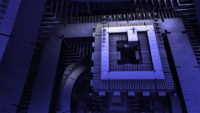Startup QuEra Is Making Major Strides in Quantum Computing
November 19, 2021
Quantum startup QuEra Computing has emerged from stealth mode with a splashy announcement of $17 million in funding and completion of a 256-qubit device the company says “will be soon accessible to customers.” Launched in 2019 by scientists from Harvard and MIT, the Boston-based firm claims to have already generated $11 million in revenue from its scalable machines in a white-hot quantum space that includes tech giants including Amazon, IBM and Google jockeying for position. QuEra’s approach leverages what the company calls “nature’s perfect qubits,” based on 256-qubit atoms.
Qubits are the basic data units of quantum computing, equivalent to the classical binary bit. Although still in the nascent stage, due to the highly unstable nature of quantum atoms used to perform the calculations, when used properly even these experimental early quantum computers can in a few seconds perform calculations that today’s supercomputers would need decades to perform, if they could manage them at all.

The answers to questions involving climate change, artificial intelligence and the structure of a virus like COVID-19 involve simulations of quantum mechanical systems, “as impossible for present-day computers as making a Pixar movie would have been for 1920s computing tools,” QuEra says in a news release about the new funding.
“The rate at which quantum computing is advancing with this particular platform we are developing is just tremendous, and it doesn’t compare to anything else,” QuEra CEO Alexander Keesling, a Harvard physicist and co-inventor of QuEra’s technology told VentureBeat.
“Just like our partners at Rakuten,” there are people who are well-tuned-to-technological-developments “at companies that have recognized this and are looking into what quantum computing is going to enable them to deal with and how to ensure they incorporate this into their processes,” Kessling explained in the VB interview, noting that commercial use for quantum computing includes building-out “data stacks and data strategies.”
QuEra’s Rydberg schema uses lasers to position and manipulate arrays of atoms. Another approach is to use superconducting circuits, as is the case with IBM’s recently unveiled 127-qubit Eagle chip. In October, Amazon announced the opening of the AWS Center for Quantum Computing at Caltech.

No Comments Yet
You can be the first to comment!
Sorry, comments for this entry are closed at this time.